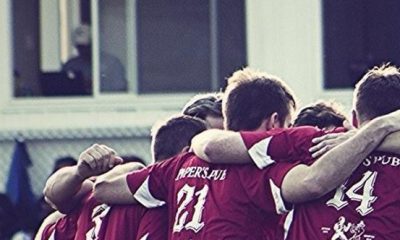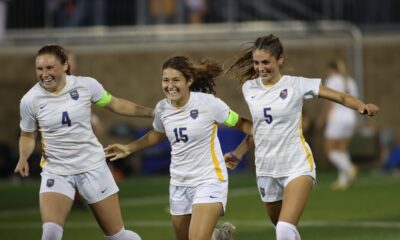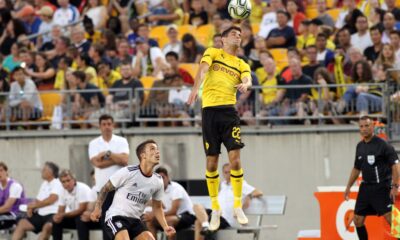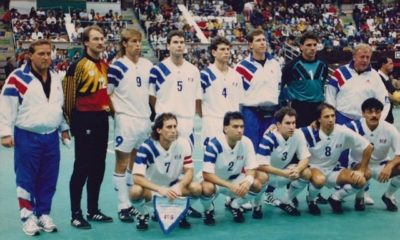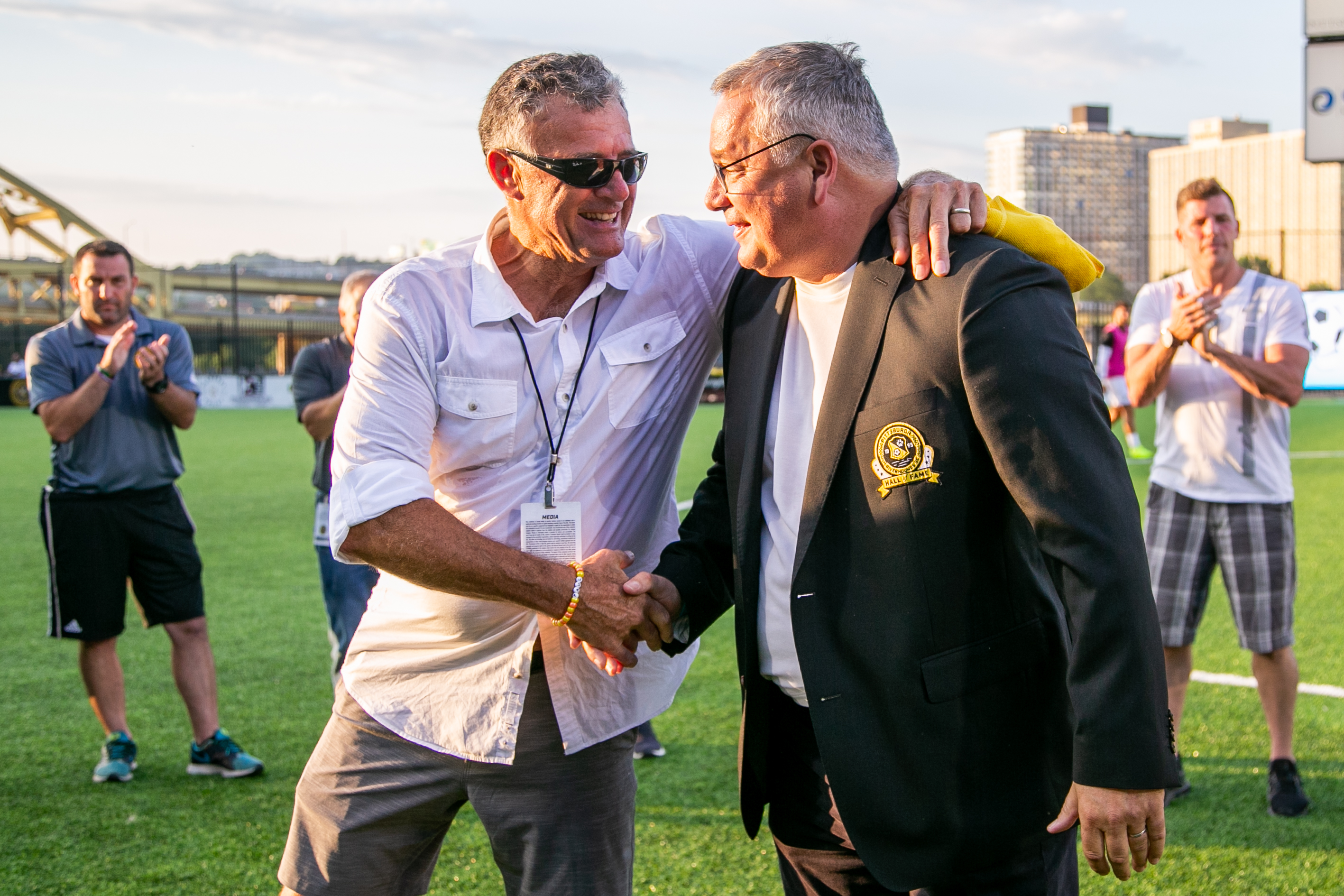
As I parked, then started to head toward the entrance to the Highmark Stadium complex prior to the first-ever Hall of Fame induction ceremony on an early, sunlit Pittsburgh summer Friday evening on July 12, the first person I encountered was Justin Evans, who pulled in right next to my car with his wife and eight-year old son.
Evans hadn’t been back to Highmark Stadium much in the past five years, since being unceremoniously sacked as the team’s head coach after a more than a five-year run (from 2009-2014), and over 100 matches at the helm of his hometown club.
A Peters Township native, Evans, was also the first-ever player selected by the Riverhounds in 1999, playing in more than 100 matches and proved himself worthy of being the first selection, by becoming a fixture in the Hounds’ record books.
When Evans stepped out of his car, he was sporting a pair of shades, a newfound beard and a smile as bright as the evening sky.
He was back in a soccer home he helped build — and it was all good.
After all, it was going to be a night that Evans and four other men who helped build the Riverhounds organization would have their moment in the sun and be celebrated for their accomplishments.
This group of men would set a high standard for professional soccer in Pittsburgh.
The Hounds organization did a wonderful thing to start the Hall of Fame, fittingly in the 20th season in club history as they couldn’t have inducted a more deserving group as its first-ever class.
Evans’ former teammate, Davis Flavius, his former coach John Kowalski, general manager Dave Kasper, and the club’s first owner, Paul Heasley, each played a pivotal role in setting the foundation in building a franchise that, through all of its ups and downs, has remained a part of the United States professional soccer landscape for twenty years.
Evans, and his fellow inductees finally got their well-deserved due and moment in the spotlight — along with some snappy new sport coats.
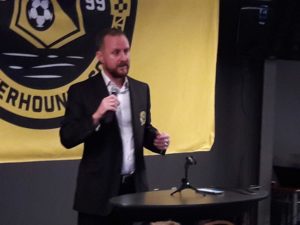
Justin Evans at the Riverhounds SC Hall of Fame ceremony, Friday, July 12, 2019 (photo credit – John Krysinsky)
When brought up to receive his jacket and officially be inducted into the Hall of Fame, Evans went on to praise the other inductees, but recalled a time when young kids playing soccer in Pittsburgh didn’t have a pro franchise to follow or to aspire to play for some day.
“When I was a kid, we didn’t have all of this,” Evans said. “There was nothing to look forward to. Mr. Heasley made it possible. He put it on the map for me and everyone around the City.”
“Dave (Kasper), I played for when I was 10 years old. He was the right guy to build the team,” Evans added. “John (Kowalski) brought a world of experience, and I learned so much from, and David (Flavius), what can I say? He was so fast, became an amazing scorer, and an even better teammate person.”
It was also fitting that Evans, who began and ended his journey as a professional soccer player in his hometown, was surrounded by his family.
The former Peters Township, Penn State and St. Bonaventure standout became emotional when thanking his parents, who he praised as “always there” for him.
Evans also quickly quipped that they “sent me off to Germany and England, all by myself” when he was just a kid, to help him develop as a soccer player, because those opportunities here in Pittsburgh simply weren’t available at that time.
Not only was Evans the club’s first player selected, but probably fittingly on this night, the first inducted into the Hall of Fame. Evans’ competitive fire added to his immense talents every time he stepped foot on the field.
“That first year, if there was a category, Justin was probably leading it,” said former teammate Steve Bell. “Whether it was a practice, or it was a game, whether it was a scrimmage, Justin was going 100 miles per hour. He was a key that first year.”
The ceremony was co-hosted by Gene Klein and Paul Child, who each will likely someday have their moment in the sun for their immeasurable contributions to the Riverhounds’ franchise and Pittsburgh soccer. At the ceremony, Evans was joined in person by Flavius and Kowalski, along with the family of Heasley, who passed away in 2013.
Kasper, a Bridgeville native, was with his current club, D.C. United, at their game. Kasper’s been General Manager of DC United for more than a decade.
The honorees were surrounded and supported by many former members from the Riverhounds first team. Through various conversations during the festivities, a name for the first-ever team started to circulate around the room: the Ninety-Niners.
This was a group that played before 5,000 fans a game at Bethel Park Stadium in the franchise’s inaugural season, a mark that hasn’t been surpassed since.
Think about that for a moment. For all of the great strides that have been made with the Riverhounds: the USL Championship’s largest year-over-year increase in home attendance this year (as pointed out in Matt Gajtka’s ‘View from the Booth’ column); seven years after the addition of a new, soccer only stadium with one of the best sight lines in all of American professional soccer; the addition of a strong, stable supporters group that is there game in and game out; the implementation of a Developmental Academy that has grown the organization by leaps and bounds to players of all ages — and the Riverhounds have yet to surpass what that team accomplished in 1999, in terms of fan support.
All of the people who were part of the Riverhounds organization in those early early years were trail blazers. Following the short-lived, but spectacular run of the Pittsburgh Spirit in the 1980s, they successfully established an organization that filled a significant void left in Pittsburgh for soccer, and created one that would become the longest running professional soccer club in the region’s history.
“My father started this team for the community and for all the kids that had a passion for soccer,” Luke Heasley, who accepted at the ceremony on behalf of his father, who passed away shortly after Highmark Stadium opened in 2013.
“He saw the need for professional soccer to be part of the Pittsburgh landscape.”
The younger Heasley also joked that his dad founded the Hounds for him.
The current Riverhounds owner, Tuffy Shallenberger reflected at the end of the ceremony, stating that he never met Paul Heasley, but felt an immediate connection.
Shallenberger admitted that like Heasley, he’s not someone who knows the game inside and out, but is deeply committed to seeing the growth of the sport in Pittsburgh. Also, much like Heasley, Shallenberger said he prefers to stay in the background.
“He was there, you would see him, but he would never really inject himself into it,” Evans said of Heasley. “He would sort of stand in the shadows and sit in the back a little bit, but you always knew that he had his hand on the pulse of the whole thing, that he was the one running it.”
There have been some struggles in the past two decades for this franchise, including a bankruptcy that brought immense uncertainty in 2014. This was the same year when Evans was let go, and Shallenberger took over.
It was a dark time for Pittsburgh soccer.
During this muddled time, with cost overruns from Highmark Stadium putting the overall future of the Pittsburgh Riverhounds in serious jeopardy, Shallenberger took the reigns as the majority owner,doing what was needed to keep the franchise going while humbly admitting he’s made some mistakes along the way.
Ironically, Shallenberger had similar vision as Heasley, and during this ceremony, the current Riverhounds owner said he’s making his best effort to carry out that vision to help grow the game in the Pittsburgh area.
With club reaching this milestone year of celebrating 20 years, this was the perfect time to create the Hall of Fame to enshrine the legacy of its trailblazers and establish a forum to celebrate the club’s history. Things came together neatly at the Hall of Fame Ceremony — and the following day for a fun weekend of festivities.
You could say that the full metamorphosis actually came less than a week later, when a vision carved out by Heasley 20 years earlier finally became a reality.
On July 17, the Riverhounds and Allegheny Health Network made a joint announcement for the building of an ambitious health and soccer training facility, along with the 10 fields in Montour Junction, which will be fully completed by 2021.
This was a big part of Mr. Heasley’s initial plans. He had proposed a similar facility and development where the current Top Golf Facility in Bridgeville eventually would be built.
All these years later, Heasley’s vision would finally come to fruition with the development of the Montour Junction complex.
Shallenberger echoed his excitement with where things currently have evolved, but cautioned, “We still have a lot of work to do.”
Despite its cost overruns and complications, Highmark Stadium has clearly become Pittsburgh soccer’s mecca but it wasn’t enough. Now, with a new training facility that rivals Major League Soccer club facilities, those who paved the way more than 20 years ago can only marvel at how far things have come.
They were the ones who helped make it all possible.
The names of the inductees were put on display during the Hounds match the night after the induction ceremony, on glass panels outside the stadium’s club area.
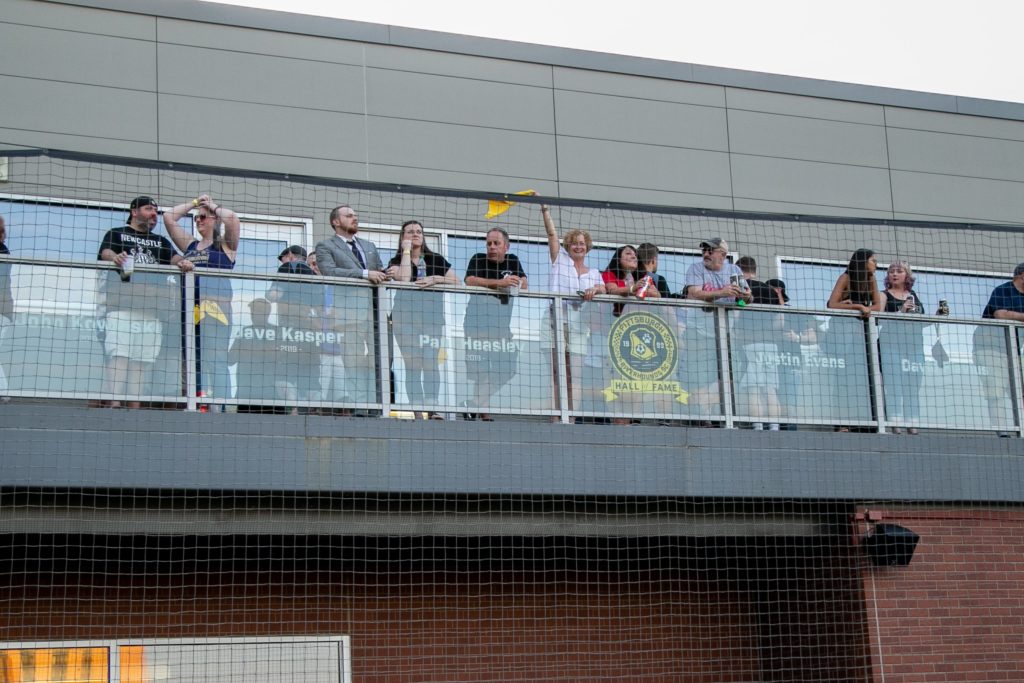
Photo courtesy Pittsburgh Riverhounds SC
“We don’t have a chance for any of this without those first steps that those guys made,” Bob Lilley, the franchise’s current coach, said. Lilley was early in his coaching career in Hershey at that time, with one of the early rivals of the Hounds organization.
“I was very worried. I knew Dave Kasper. I knew John Kowalski. I knew a lot of people they would have in place would make life very miserable for me. I was very impressed with what they did in 1999, and the players they were able to get.”
Lilley said that he had his eyes particularly on Evans, who he even tried to persuade from signing with his hometown club.
“Back then, when drafted, a team had only a week to sign a player, then could sign anywhere,” Lilley said. “I tried to convince him to sign with Hershey when those two weeks were up. But ultimately, he would sign with his hometown. I think Dave and John having coached him had a lot to do with him
Founding the club on March 11, 1998, Heasley formed an organization that achieved success within its first professional season. With help from the likes of Kasper and Kowalski, the Heasley-led club was named USL A-League Organization of the Year in 1999.
Kowalski’s resume prior to taking the Hounds job was already impressive. He wasn’t just the guy who coached the Pittsburgh Spirit in its heyday, later Robert Morris’ men’s program, then the Tampa Bay Mutiny. Klein was sure to mention that Kowalski once coached the U.S. Men’s National Team, and led U.S. Futsal teams to the highest placement any American squad has ever placed in any soccer international competition when he guided them to Silver and Bronze place finishes in World Futsal Championships in 1988 and 1992.
With the Hounds, Kowalski implemented a forward, attacking style of play — about 1.84 goals per game — and was attractive to new fans.
“Playing attractive soccer, playing offensive soccer, which requires lots of skill, I think the kids were able to pick up on it,” Kowalski said. “There were oohs and aahs, it wasn’t just a kind of ordinary ‘kick the ball forward and chase’ style of play.”
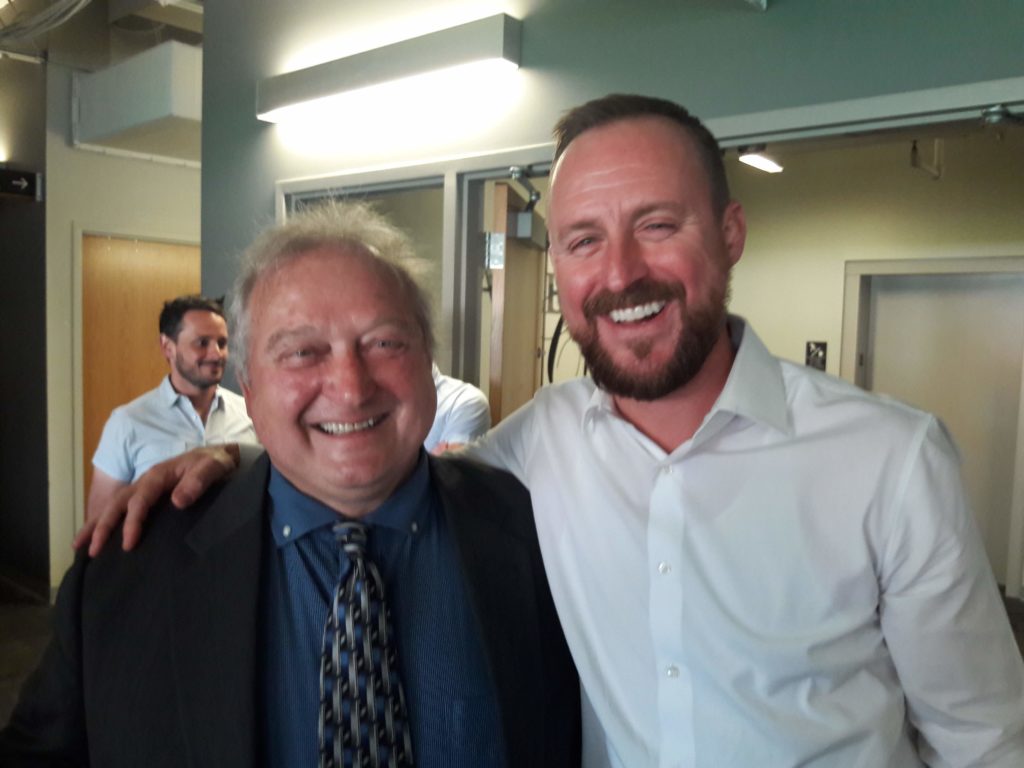
John Kowalski (left) and Justin Evans (right) at Hall of Fame festivities on Friday, July 12.
Evans and Flavius were also both a part of the franchise’s inaugural 1999 season. Evans went on to appear in 101 games and rack up 50 points in his Hounds career. He is one of four players in franchise history to reach both of these plateaus.
When it comes to the club’s record book — Flavius is the guy who set the bar. Like Evans, he’s another player to reach the 100-appearance and 50-point mark in his Pittsburgh career. The striker from Saint Lucia pointed out during the ceremony, that he was among the 100 or so players that showed up for the Hounds first-ever open tryouts in 1999.
The speedy striker was quick to impress Kasper, Kowalski, the Hounds coaching staff and his eventual teammates.
After an impressive eight seasons, Flavius still holds team records in games played (183) and points (141).
Flavius’ three playoff goals are most in team history. Playing from 1999 to 2006 with the franchise, the striker was twice named All-League Second Team.
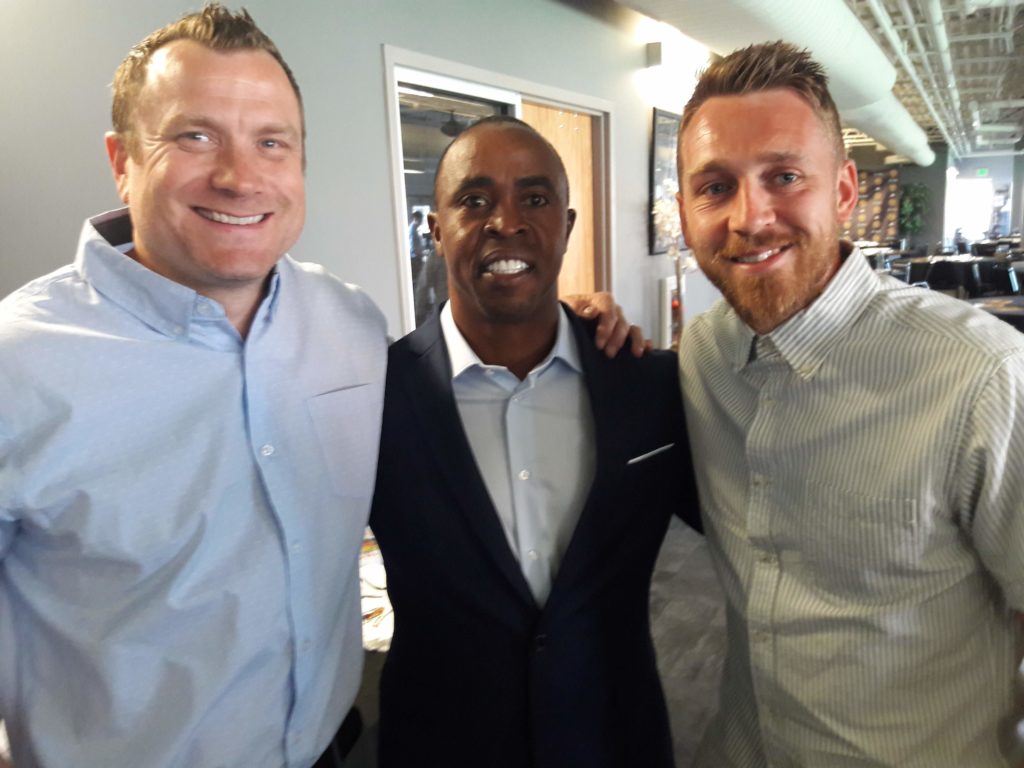
David Flavius, pictured in center, still holds the Hounds records for games played, points and goals. (photo credit – John Krysinsky)
Retiring after the 2006 campaign, Flavius’ 58 career league goals also still hold as the all-time club record.
The Hall of Fame ceremony on Friday turned out to be just the beginning of a weekend celebration. Evans and the ’99ers, along with some other former Hounds dusted off their boots and took the field for a friendly match against the Riverhounds Academy’s U19 squad on Saturday afternoon.
This inaugural Hall of Fame class was also honored during a special halftime ceremony during the Hounds match later that night, which, by the way, turned out to be a 1-1 draw vs Tampa Bay Rowdies.
Kasper joined the festivities on Saturday evening.
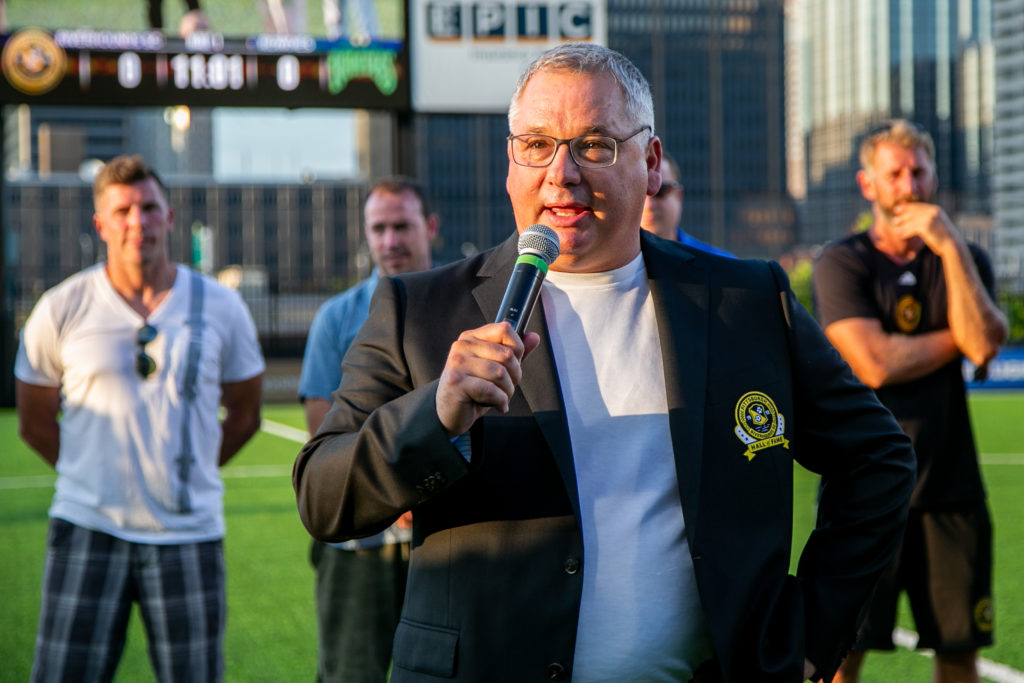
Dave Kasper joined the festivities on Saturday, July 13, at halftime of the Hounds 1-1 draw vs Tampa Bay (photo courtesy Pittsburgh Riverhounds SC)
You don’t become an “Organization of the Year” without someone who can put all the pieces together — and make it work.
That’s what Kasper did.
While Heasley provided support and remained in the background, it was Kasper who put it all together.
Kowalski was still coaching the Mutiny in Major League Soccer in 1998 when the Pittsburgh soccer franchise was announced for the A-League. When he was contacted by Heasley to see who he thought would be the right man to build a team, Kasper was the first name that came to mind.
When Kowalski came available, Kasper hired him to be the first coach in Hounds history. It was Klein and Child who were right there with Kowalski to help steer the team in its first season.
Kasper propelled the team to its early success and organizational stability. Among players he helped sign to the professional team in its inaugural season, names such as Randy Dedini, Gary DePalma, Evans, Flavius and Jaman Tripoli account for five of the 11 players in team history who have recorded at least 100 games played.
Kasper quickly built a solid reputation with his impressive work with the Riverhounds organization. Eventually he found a prime opportunity to jump into the front office with the DC United. In more than 18 years with the United, Kasper’s won five major trophies (one MLS Cup, two Supporters Shield and two Open Cups). Today, Kasper continues to look for his sixth trophy while signing the likes of Wayne Rooney and overseeing the United’s transition into a new era, with sparkling new Audi Field in the District of Columbia.
For Kasper, though, it all started in his hometown, with the Riverhounds.
Twenty years have passed, and while the torch has been passed to a new generation, those five men were the ones who blazed an impressive trail to get it all started.
Finally, after twenty years, they had a well-deserved day in the sun.
HALL OF FAME WEEKEND PHOTO GALLERY
Five Pittsburgh soccer trail blazers elected to Riverhounds SC’s first-ever Hall of Fame Class












